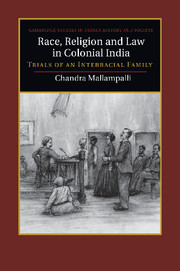Book contents
1 - Remembering Family
Published online by Cambridge University Press: 05 December 2011
Summary
I knew the late Matthew Abraham ... I recollect Matthew Abraham’s first coming as a writer. He then wore the Native dress. Matthew Abraham was living [in a thatched house] in Cowl Bazaar when I first became acquainted with him.
– Deposition of Plaintiff’s forty-second witness, January 5 and 6, 1858. Geengar Venkapa, son of Venkapa, caste Geengar, Vishnoo religion, aged sixty years, Carpenter by trade, and residing at BellaryFamily life often is associated with what is private, idiosyncratic, and unlearned. Family members hold a unique capacity either to support or aggravate each other because they know each other in ways that outsiders do not. Forms of parental discipline, patterns of alcohol addiction, the jewelry or clothing worn by one’s mother, whether a younger sibling is bullied or coddled, or the roles that adults and children play at mealtimes are rarely learned from normative texts or defined by state regulations, but are experiences that vary from household to household. When family practices, however, are subject to judicial scrutiny as were those of the Abrahams, much of this interiority is compromised. Personal forms of knowledge are turned over to the courts, enmeshed with legal categories and idiom, and refashioned by the competing interests of litigants.
Retrieving a family history from the wide spectrum of witnesses deposed in Abraham v. Abraham is the primary aim of this chapter. Having described Bellary as a complex cultural frontier that was reshaped by colonialism, I now wish to situate both sides of the Abraham family within Bellary’s social landscape. To access their past, we must put the information submitted in court to different uses than what lawyers or judges had originally intended. Details concerning the dress, lifestyle, dwellings, or occupations of the Abrahams or other witnesses must be released from the case’s structuring binary of English versus Hindu law. Only then can we appreciate the rich social tapestry revealed in the testimonies. In setting aside this binary, we resist a tendency in historiography to privilege the priorities of state institutions or nations – in this case, the priorities of the judiciary in classifying people according to religion. “A critical historiography,” Ranajit Guha observes, consists of “bending closer to the ground in order to pick up the traces of a subaltern life in its passage through time.” For our purposes, this entails gleaning information from oral testimonies, which may or may not have been material to the outcome of the case, but which nevertheless helps us reconstruct the society of early colonial Bellary.
- Type
- Chapter
- Information
- Race, Religion and Law in Colonial IndiaTrials of an Interracial Family, pp. 25 - 50Publisher: Cambridge University PressPrint publication year: 2011



